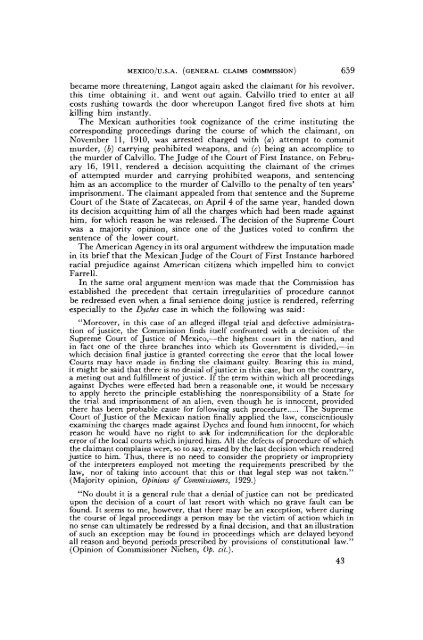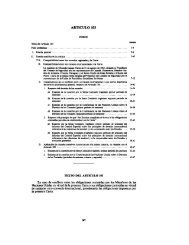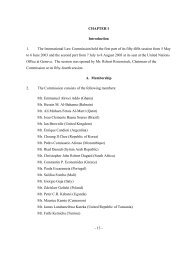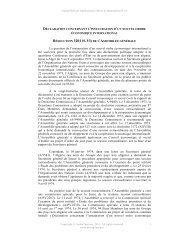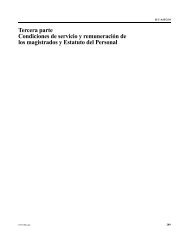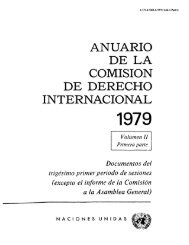Joseph A. Farrell (U.S.A.) v. United Mexican States - United Nations ...
Joseph A. Farrell (U.S.A.) v. United Mexican States - United Nations ...
Joseph A. Farrell (U.S.A.) v. United Mexican States - United Nations ...
Create successful ePaper yourself
Turn your PDF publications into a flip-book with our unique Google optimized e-Paper software.
MEXICO/U.S.A. (GENERAL CLAIMS COMMISSION) 659<br />
became more threatening, Langot again asked the claimant for his revolver,<br />
this time obtaining it, and went out again. Calvillo tried to enter at alJ<br />
costs rushing towards the door whereupon Langot fired five shots at him<br />
killing him instantly.<br />
The <strong>Mexican</strong> authorities took cognizance of the crime instituting the<br />
corresponding proceedings during the course of which the claimant, on<br />
November 11, 1910, was arrested charged with (a) attempt to commit<br />
murder, (b) carrying prohibited weapons, and (c) being an accomplice to<br />
the murder of Calvillo. The Judge of the Court of First Instance, on February<br />
16, 1911, rendered a decision acquitting the claimant of the crimes<br />
of attempted murder and carrying prohibited weapons, and sentencing<br />
him as an accomplice to the murder of Calvillo to the penalty of ten years'<br />
imprisonment. The claimant appealed from that sentence and the Supreme<br />
Court of the State of Zacatecas, on April 4 of the same year, handed down<br />
its decision acquitting him of all the charges which had been made against<br />
him, for which reason he was released. The decision of the Supreme Court<br />
was a majority opinion, since one of the Justices voted to confirm the<br />
sentence of the lower court.<br />
The American Agency in its oral argument withdrew the imputation made<br />
in its brief that the <strong>Mexican</strong> Judge of the Court of First Instance harbored<br />
racial prejudice against American citizens which impelled him to convict<br />
<strong>Farrell</strong>.<br />
In the same oral argument mention was made that the Commission has<br />
established the precedent that certain irregularities of procedure cannot<br />
be redressed even when a final sentence doing justice is rendered, referring<br />
especially to the Dyches case in which the following was said:<br />
"Moreover, in this case of an alleged illegal trial and defective administration<br />
of justice, the Commission finds itself confronted with a decision of the<br />
Supreme Court of Justice of Mexico,—the highest court in the nation, and<br />
in fact one of the three branches into which its Government is divided,—in<br />
which decision final justice is granted correcting the error that the local lower<br />
Courts may have made in finding the claimant guilty. Bearing this in mind,<br />
it might be said that there is no denial of justice in this case, but on the contrary,<br />
a meting out and fulfillment of justice. If the term within which all proceedings<br />
against Dyches were effected had been a reasonable one, it would be necessary<br />
to apply hereto the principle establishing the nonresponsibility of a State for<br />
the trial and imprisonment of an alien, even though he is innocent, provided<br />
there has been probable cause for following such procedure The Supreme<br />
Court of Justice of the <strong>Mexican</strong> nation finally applied the law, conscientiously<br />
examining the charges made against Dyches and found him innocent, for which<br />
reason he would have no right to ask for indemnification for the deplorable<br />
error of the local courts which injured him. All the defects of procedure of which<br />
the claimant complains were, so to say, erased by the last decision which rendered<br />
justice to him. Thus, there is no need to consider the propriety or impropriety<br />
of the interpreters employed not meeting the requirements prescribed by the<br />
law, nor of taking into account that this or that legal step was not taken."<br />
(Majority opinion, Opinions of Commissioners, 1929.)<br />
"No doubt it is a general rule that a denial of justice can not be predicated<br />
upon the decision of a court of last resort with which no grave fault can be<br />
found. It seems to me, however, that there may be an exception, where during<br />
the course of legal proceedings a person may be the victim of action which in<br />
no sense can ultimately be redressed by a final decision, and that an illustration<br />
of such an exception may be found in proceedings which are delayed beyond<br />
all reason and beyond periods prescribed by provisions of constitutional law."<br />
(Opinion of Commissioner Nielsen, Op. cit.).<br />
43


